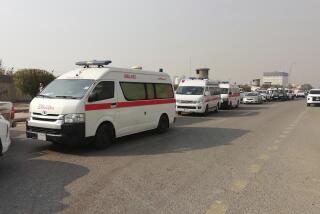13 die in Baghdad clash, U.S. says
- Share via
BAGHDAD — U.S. soldiers arrested a police lieutenant suspected of working for an Iranian-backed militia after a battle in the capital Friday that left six Iraqi policemen and seven gunmen dead, the U.S. military said.
The U.S. troops, on a predawn raid in east Baghdad to arrest the lieutenant, were ambushed by gunmen on rooftops, at a church and at a police checkpoint. The soldiers called in air support, and a fixed-wing aircraft fired directly in front of the police checkpoint.
The U.S. military said the airstrike was meant as a warning and that the soldiers had tried to avoid hurting any policemen.
“Coalition forces returned fire in accordance with escalation-of-force rules,” the military said in a statement. “Initial reports indicate that approximately seven terrorists and six Iraqi police were killed in the firefight.”
The military described the lieutenant as a leader of the so-called Iraqi Special Groups, an alleged offshoot of radical Shiite Muslim cleric Muqtada Sadr’s Al Mahdi militia. U.S. officials believe the arrested officer had received funding from Iran’s Revolutionary Guard.
The military alleged that the suspect coordinated logistical support from Iran for militants and led cells that attack U.S. forces with armor-piercing bombs, mortars and rockets.
An Iraqi Interior Ministry spokesman, Brig. Gen. Abdul Kareem Khalaf, called the shootout a “misunderstanding,” and said three Iraqi policemen were killed and nine wounded. He said he didn’t know whether any police officers had been arrested in the clash, which occurred at 2 a.m.
The incident came a day after the Bush administration released a report on Iraq’s political, economic and security progress that reiterated that security forces were still plagued by sectarianism and militia infiltration.
“The fact of the matter is that there are elements of the Iraqi police and elements of Iraqi army that are infiltrated, and the Iraqi government is working very hard to work their way through that,” Marine Gen. Peter Pace, chairman of the Joint Chiefs of Staff, said Friday at a news briefing in Washington.
In Baghdad on Friday, at least three mortar rounds slammed into the fortified Green Zone, killing two Iraqi soldiers and injuring one, an Iraqi security official said. Firetrucks and police cars raced through the area, and helicopters swooped overhead in the aftermath of the bombardment. U.S. civilian employees in the secured area, which houses the U.S. and British embassies and Iraqi government offices, have been required in recent days to wear body armor and helmets because of the rising threat of rocket and mortar attacks.
On Tuesday, fierce shelling in the Green Zone killed three people, including a U.S. soldier, and wounded 18 people. Among the wounded were five Americans: two soldiers and three contract employees.
In Washington, Defense Secretary Robert M. Gates, speaking at the briefing with Pace, said that he expected mortar and rocket attacks to intensify through September, when a critical evaluation by U.S. Ambassador Ryan Crocker and ground commander Gen. David H. Petraeus is to be submitted to Congress.
The attacks in Baghdad come from both Shiite Muslim and Sunni Arab areas, but are thought to originate more frequently from districts considered strongholds of Shiite militants. The Americans have repeatedly accused Iran of arming Shiite extremists in Iraq.
In Tehran on Friday, former Iranian President Hashemi Rafsanjani said the difficulties the U.S. was facing in Iraq were divine punishment and drew parallels between America’s experience with Russia’s invasion of Afghanistan nearly three decades ago.
“Now we see that God has taken revenge on the U.S. government, and their soldiers are killed every day and the U.S. Army has become stuck in the quagmire of Iraq, as the Soviets in Afghanistan and Americans in Vietnam,” Rafsanjani, who is also a cleric, said in his Friday prayer sermon.
“Now Americans are looking for a face-saving way to withdraw from Iraq to avoid the disgraceful withdrawal from Vietnam and defeat of Soviet forces in Afghanistan, which led to the further collapse of the whole Soviet Union,” he said.
Meanwhile, the U.S. military said a reputed leader of Al Qaeda in Iraq had surrendered Friday to U.S. forces and Iraqi troops at the Baghdad airport. The man was blamed for car bombings and mortar attacks in west Baghdad and in trouble spots such as Mahmoudiya, south of the capital, the military said, but gave no further information.
Twenty-one bodies, the majority of them with gunshot wounds, were found around Baghdad on Friday, most in the western half of the city.
Five corpses were found in the northern town of Amerli, where a devastating suicide truck bomb Monday leveled buildings and killed as many as 150 people, residents said.
Times staff writers Julian E. Barnes in Washington, Saif Hameed, Saif Rasheed, Zeena Kareem and Raheem Salman in Baghdad and special correspondent Ramin Mostaghim in Tehran contributed to this report.
More to Read
Sign up for Essential California
The most important California stories and recommendations in your inbox every morning.
You may occasionally receive promotional content from the Los Angeles Times.












